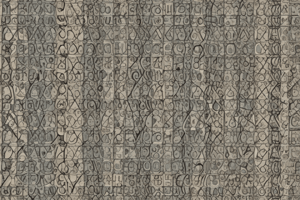Podcast
Questions and Answers
What is a sequence?
What is a sequence?
a pattern of numbers increasing or decreasing by a certain amount each time
What is an arithmetic sequence?
What is an arithmetic sequence?
a sequence in which each term is found by adding or subtracting the same number to the previous term
An example of an arithmetic sequence (addition) is ___
An example of an arithmetic sequence (addition) is ___
-12, -5, 2, 9, 16, 23
An example of an arithmetic sequence (subtraction) is ___
An example of an arithmetic sequence (subtraction) is ___
What is a geometric sequence?
What is a geometric sequence?
An example of a geometric sequence (multiplication) is ___
An example of a geometric sequence (multiplication) is ___
An example of a geometric sequence (division) is ___
An example of a geometric sequence (division) is ___
What type of sequence is -3, -9, -27, -81, -243?
What type of sequence is -3, -9, -27, -81, -243?
What type of sequence is 54, 51, 48, 45, 42?
What type of sequence is 54, 51, 48, 45, 42?
What is a recursive equation?
What is a recursive equation?
The recursive equation formula for arithmetic sequences is ___
The recursive equation formula for arithmetic sequences is ___
The recursive equation formula for geometric sequences is ___
The recursive equation formula for geometric sequences is ___
An example of a recursive equation for an arithmetic sequence (addition) is ___
An example of a recursive equation for an arithmetic sequence (addition) is ___
An example of a recursive equation for an arithmetic sequence (subtraction) is ___
An example of a recursive equation for an arithmetic sequence (subtraction) is ___
An example of a recursive equation for a geometric sequence (multiplication) is ___
An example of a recursive equation for a geometric sequence (multiplication) is ___
An example of a recursive equation for a geometric sequence (division) is ___
An example of a recursive equation for a geometric sequence (division) is ___
What does t represent in t(n)?
What does t represent in t(n)?
What does n represent in t(n)?
What does n represent in t(n)?
Sequences can contain decimals.
Sequences can contain decimals.
Fractions cannot be contained in sequences.
Fractions cannot be contained in sequences.
Flashcards are hidden until you start studying
Study Notes
Sequences Overview
- A sequence is a pattern of numbers that either increases or decreases by a specific value, either consistently adding or subtracting.
Types of Sequences
-
Arithmetic Sequence: Each term is generated by adding or subtracting the same number to/from the previous term.
- Example of Addition: -12, -5, 2, 9, 16, 23 (increases by 7).
- Example of Subtraction: 50, 47, 44, 41, 38 (decreases by 3).
-
Geometric Sequence: Each term is obtained by multiplying or dividing the previous term by a fixed number.
- Example of Multiplication: 2, 4, 8, 16, 32 (multiplies by 2).
- Example of Division: 567, 189, 63, 21, 7 (divides by 3).
Identify Sequence Types
- Geometric Example: -3, -9, -27, -81, -243 (multiplies each term by 3).
- Arithmetic Example: 54, 51, 48, 45, 42 (subtracts 3 from each term).
Recursive Equations
-
A recursive equation defines how to calculate the next term in a sequence based on current or earlier terms.
-
Arithmetic Recursive Equation for Addition:
- Formula: t(n+1)=t(n)+x
-
Arithmetic Recursive Equation for Subtraction:
- Formula: t(n+1)=t(n)-x
-
Geometric Recursive Equation for Multiplication:
- Formula: t(n+1)=t(n)*x
-
Geometric Recursive Equation for Division:
- Formula: t(n+1)=t(n)/x
Examples of Recursive Equations
- Arithmetic (Addition): Sequence 2, 4, 6, 8, 10 with formula t(n+1)=t(n)+2.
- Arithmetic (Subtraction): Sequence 9, 6, 3, 0, -3 with formula t(n+1)=t(n)-3.
- Geometric (Multiplication): Sequence 1, 5, 25, 125, 625 with formula t(n+1)=t(n)*5.
- Geometric (Division): Sequence 100, 50, 25, 12.5, 6.25 with formula t(n+1)=t(n)/2.
Terminology
- t in t(n): Represents the term in the sequence, which is a constant.
- n in t(n): Refers to the term number in the sequence.
Properties of Sequences
- True: Sequences can contain decimal numbers.
- False: Sequences can also include fractions, contrary to the notion that they cannot.
Studying That Suits You
Use AI to generate personalized quizzes and flashcards to suit your learning preferences.




